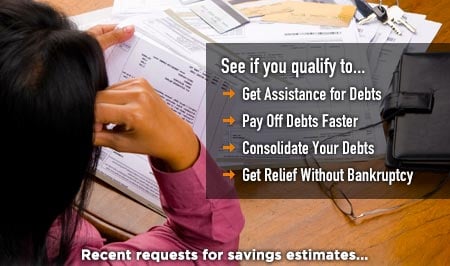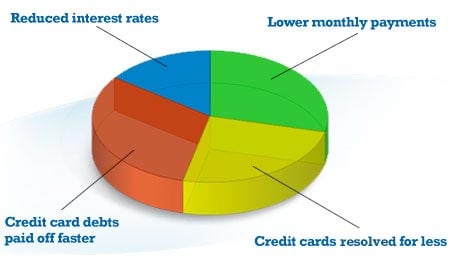
Debt Consolidation
Bundling all your unpaid loans and credit card bills into one payment when you're up to your ears in debt may sound like a good idea as long as you've got the willpower to put away your credit cards, develop better spending habits, and make regular monthly payments. In the ever-expanding world of debt relief, debt consolidation is one of the most frequently used methods many consumers use to get rid of debt. Debt consolidation (aka a debt management plan) will typically let you combine all your high-interest credit card debts into one lower monthly payment that you make to a credit counseling agency. Acting on your behalf, a credit counselor will make proposals on your behalf and distribute your monthly payment to your creditors based on a repayment plan that worked out. In many cases, this monthly payment is significantly lower than what you were currently paying because the proposals usually include lower interest rates, and waiving of fees and other penalties that may be on your account. Many people have found success using debt consolidation because, in most cases, once they stop using their credit cards and interest rates are reduced, they would have more money each month that can actually go towards paying the principal amount of the debt instead of just paying interest. For many consumers, debt consolidation offers an effective and honest method of paying the full amount of their unsecured debt, and gaining better control of their finances.
With the terms associated with debt relief so closely intertwined, it sometimes gets a little tricky spotting the differences between the different terms. That's why we have provided this information for you so you can see for yourself what makes each option unique from the other. One other option that many consumers pursue is to get a debt consolidation loan. Unlike debt consolidation or a debt management program, a debt consolidation loan typically combines all your high interest debts into one lower interest loan. But beware of the potential pitfalls of taking out a new personal loan. While it is a workable and proven solution for paying down debt and rebuilding bad credit, in some cases, people who take debt consolidation loans end up running high interest credit cards all over again. Now they have credit cards with high interest plus a loan. For instance, if an unexpected expense comes up, who's to stop you from using plastic to pay for it? And worse, if you use your home to secure the loan, you may have put your home in jeopardy if you default on the terms of your loan. That's why it's crucial that you get aligned with reputable debt consolidation companies who will answer all your questions, spend time with you, and give you all the facts you need to make a sound decision regarding your financial future.
You may have probably wondered about settling or negotiating your debts a perfectly legal solution that's also been proven to be effective in eliminating debt. Under a debt settlement program, credit card companies will agree to "forgive or settle" your debt for a considerably lesser amount than what you owed. Debt settlement clients are usually advised to stop paying their bills and instead save up cash that is then used to negotiate a one-time lump sum payment. You may be surprised at how many credit card companies are willing to settle consumers' debts and it's easy to understand why. If credit card companies decide to "sell off" what they consider to be "bad debt" or the amount they are likely not going to be able to collect from you to a third-party debt collector, they will often receive as little as 10 cents on the dollar. And if you're severely hampered by debt and decide to file bankruptcy, they won't be able to collect all. However, if those creditors receive a reasonable offer to settle from you, or made on your behalf by a debt settlement company, they are likely to agree to settle your debt instead. If you're interested in learning more about your debt reduction options, we can provide you with more information about reputable companies that offer an array of debt relief services.
But just like with taking out a consolidation loan, debt settlement also presents potential problems for consumers. Think of the fees, for one. Depending on the company, debt settlement may be prohibitively expensive. Some settlement companies charge 14 to 18 percent of the total value of the debt you want settled, while others may charge a percentage of the debt savings once you settle. Another thing to keep in mind is the impact negotiating your debt might have on your credit score. Some creditors, once they know you are working with a debt settlement company, may even send threatening letters and even sue you to collect the full amount that you owed. Consider that with bankruptcy, your creditors will stop their collection efforts as soon as you file. Not so with debt settlement. Another secret that debt settlement companies might not be so forthcoming with you is that the Internal Revenue Service might consider forgiven debt to be taxable income. In some cases, that amount can push some people to fall back deeper into debt simply because they did not consider the tax consequences. In spite of the potential drawbacks of debt settlement, many consumers still consider it a viable option and are willing to pay for whatever reduced amount they can settle with their creditors.
As you may have noticed, the debt relief industry has spawned thousands companies trumpeting the values of debt consolidation, including non profit companies, Christian debt management organizations, and even some that cater to military members and their families. While there are many reputable non profit debt relief services, be aware that some organizations may use a "non profit" status to lure consumers into thinking that they have their best interests in mind. Some even resort to using religious affiliations in their names to gain your trust. To protect yourself against potentially deceptive companies or those that will cost you an arm and a leg, it's a good idea to check out the National Foundation of Credit Counseling (NFCC), the oldest network of non profit debt management companies committed to providing free and affordable services to consumers. True non profit debt consolidation companies usually offer free counseling, money management skills, and a host of budgeting tools, such as a debt calculator or an expense tracker; while those that may charge fees (or request contributions) typically keep the rates low and affordable. The main thing to remember is, when you decide it's time to say goodbye to your credit card bills, get all the facts straight about the most popular methods of debt relief whether it's consolidation or debt management, debt settlement, or getting a loan. Also, remember to get a copy of your free credit report from one of the three major credit-reporting agencies so you can, from time to time, keep tabs of all your accounts, balances, and payment histories, as well as any inadequacies that may be listed. We can help you explore your debt reduction options, and even get you in touch with qualified companies that have been known to help consumers like you wipe out their credit card debts and learn valuable skills to ensure they remain debt free in the future.























